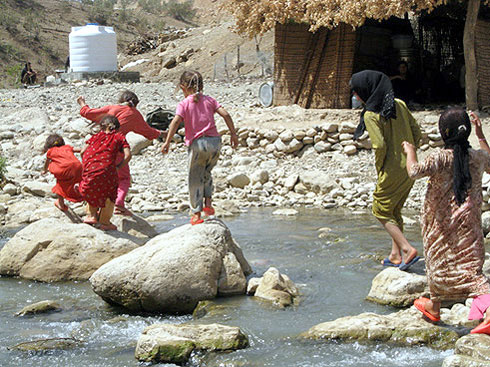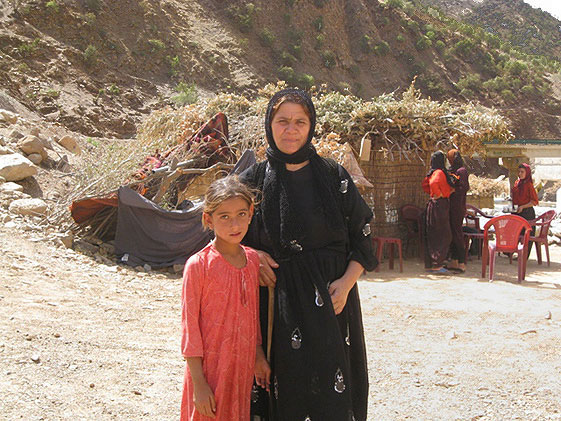 |
| Jessica Malter blogs from a region of Northern Iraq bordering Iran and Turkey where she joined an IRC team bringing clean water to displaced villagers.
In the remote Qandil mountain range in Northern Iraq, Turkey and Iran have been conducting military maneuvers to rid the region of Kurdish separatist groups believed to be based in the area. The ongoing bombing and shelling has terrified hundreds of villagers who live there, disrupting their tranquil way of life and sending them running. Over the past several months 120 families have fled the fighting and are living in what has come to be known as the Mangory Bridge Camp. “We hid in the caves around our villages for 20 days hoping the shelling and bombing would stop, but it only got worse so we came here,” Mer told me, pictured here with her daughter. “It is only a few hours from our home, but it is peaceful. Now we are just waiting. We want to go home as there is no life for us here, but it is still too dangerous.”
One of the biggest problems the families face in the camp is a lack of clean water. Warda, pictured outside of her hut, told me she thinks her daughter is sick from drinking dirty water. “We know the water is dirty because we have to use it to wash clothes and dishes,” she says. “The children play in it and sometimes end up drinking it, even though we have told them not to.”
When the IRC learned that residents of the camp were in need of drinking water, they moved quickly to get three water tanks installed the area. The tanks were delivered the day I visited the camp and are being connected to a nearby spring, which will provide the much needed clean water.
The women in the camp say they are very happy about the arrival of the new water tanks. They say it will make their daily routine easier and will keep their children healthy. They say their main concern now is where they will go when they are forced to leave the Mangory Bridge Camp.
In a month’s time the water will rise and the families will have to abandon the area. “We don’t know where we will go if the bombing and shelling hasn’t stopped by then,” said Seimya, pictured on the right. “It would be best if we could go to the town a few miles away, but we have no money to pay for rent. We are hoping the local authorities will help and provide us with some simple houses if we can’t go home.”
After four months of being away from their village, the children in the camp are bored and desperate to get home. They say they have very little to do here and back home they can at least help their families tend to their sheep and crops and have more space to play. This summer, their main activity has been racing across the stream that runs through the camp.
With the new school year just weeks away, parents in the camp are extremely concerned about the children missing school. Some are wondering if they should take their chances and go back to their village or try to find a place to settle that’s close to a school that would welcome the children. The children are anxious about the situation as well. “I like school,” Peshraw told me. He’s the one on the far left. “I want to be there on the first day. I don’t want to fall behind.” The IRC is now speaking with local authorities on behalf of the displaced villagers to try and come up with a relocation plan that will enable the children to attend school and provide a safe place for the families to live until the violence subsides and they can safely return home. |
Archive for the ‘war’ Category
Northern Iraq: Waiting to go home
Posted by jessmalter on 3 September, 2008
Posted in children, education, MiddleEast, photos, refugees, war | Tagged: iraq, Iraqi Refugees, Jessica Malter in Iraq | Leave a Comment »
Georgia Crisis: A trip to Gori
Posted by Kate Sands Adams on 28 August, 2008
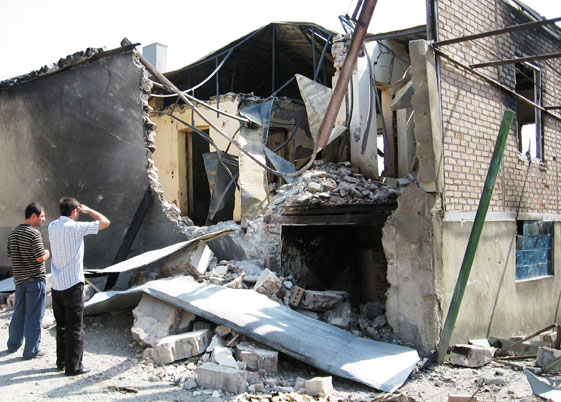 The IRC surveys homes destroyed by recent bombings in Ruisi, one of the villages surrounding the town of Gori, in Georgia. Photo: Eric James/The IRC |
 Eric James The IRC Eric James blogs from Tbilisi, Georgia, where he is coordinating International Rescue Committee programs for people uprooted by crisis in the region. “We won’t go back until it’s safe,” is the refrain I hear every day from people who fled for their lives nearly three weeks ago amid intense fighting between Georgian, Russian and assorted other forces. Roughly 160,000 people are newly uprooted in addition to a sizeable group of 250,000 displaced from conflicts dating back to the 1990s. Those who fled the most recent crisis left with little more than the clothes on their backs. In some communities, 95% of the population hit the road. The city of Gori, which had 50,000 residents, is one such place. An hour west of the capital Tbilisi, we went there to see conditions this week and look at the possibility of helping people return and recover. The main motor-route through Georgia, which connects the capital with the western part of the country, was busy with traffic on this day. There were large commercial trucks, mostly from Turkey, along with a number of security and aid vehicles. We also saw some displaced people returning to towns and villages that no doubt escaped major damage. On the horizon, a large black cloud rose from a train that had reportedly hit a landmine left by Russian forces. Immediately upon entering Gori you can see bombed out apartment blocks. They are scorched black all over and turned inside out. Streams of paper and other personal belongings litter the front grounds. In the center of town, most buildings are intact, unlike the town centers just to the north in South Ossetia where there was heavy fighting. Instead, it seems that a few bombs were dropped here to scare people and make a point. Then, troops entered with their tracked vehicles, shooting buildings at random and ordering residents to leave. Apparently the threat from landmines in Gori has been assessed as “low” because troops did not have much time to place them. Yet we were told that a woman who was out picking grapes and two children had been killed by landmines only the day before. 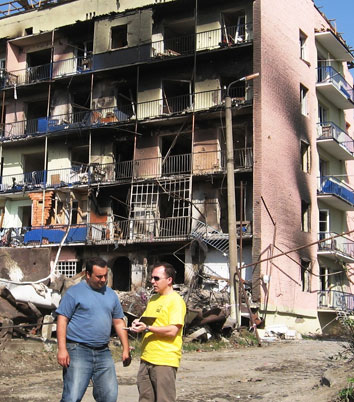 Eric James (right) takes notes on what’s needed to help communities like this one in Gori rebuild. Photo: Jason Snuggs/The IRC Gori and villages surrounding it are ever so slowly coming back to life. In the center of town we visited the City Hall. There, a hundred or more people, ready to go home, were waiting on the steps for buses to nearby villages. We talked to a few families who told us they are eager to restart their lives, but remain very worried about the future. “Look, the Russians are still only 7 kilometers away,” said one man with alarm. Our team traveled further west to Ruisi, a village of 6,000 people. Already a dry place at this time of year, fields were burning and smoke was rising as we drove past scorched trees and underbrush. In Ruisi, we met with the mayor and talked about the crisis over homemade cherry juice. He told us that the fighting disrupted the farmers’ harvest. He also said the farmers are afraid to go to their land, which is so close to the Russian troops. On August 12th, the Russian military dropped several bombs in the area and then occupied Ruisi. The mayor took us to see one of the houses that was destroyed. It was a direct hit which made it look like Hollywood had done it up as a set. Part of the house was burnt and ripped open. The rest had been vaporized. Houses across the street were also badly damaged. We looked into one living room which had debris and dust everywhere. All glass was shattered and the ceiling sagged with its panels ripped apart. We met an elderly man and woman there. The man told us he was inside the house when the explosion happened. I imaged that his ears must still be ringing. The woman dressed in black, I suppose his wife, could only shake her head and motion to the ground and sky. “Why did they do this?” she finally asked. |
Posted in Caucasus, emergencies, war | Tagged: Georgia, humanitarian aid, landmines, Russia, South Ossetia | Leave a Comment »
Missing persons / North Ossetia
Posted by Peter Biro on 21 August, 2008
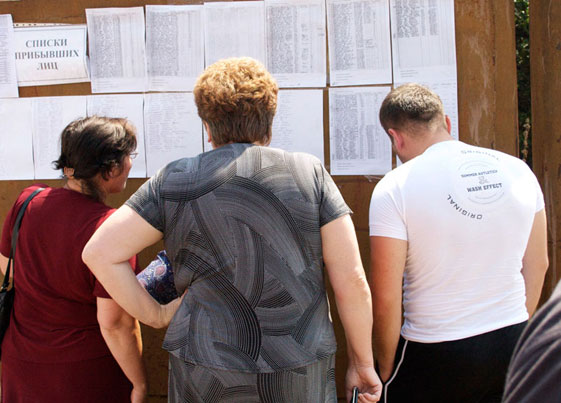 Photo: Thomas Hill/The IRC |
| The IRC’s Caucasus director Thomas Hill took this picture of South Ossetian refugees looking at lists of missing persons outside a shelter in neighbouring North Ossetia. On 12 August, Hill traveled with a group of colleagues from the North Caucasus aid community to assess refugee needs in Alagir, an industrial town west of the North Ossetian capital Vladikavkaz. Alagir is one of the first entry points for the many thousands of refugees who have poured over the border from the embattled Georgian enclave.
How You Can Help: Donate now to help the IRC assist victims of the crisis in the Georgia region and other displaced people around the world. |
Posted in Caucasus, howtohelp, refugees, war | Tagged: Caucasus, Georgia, humanitarian aid, North Ossetia, Russia, South Ossetia | Leave a Comment »
Children fleeing war / Georgia
Posted by The IRC on 14 August, 2008
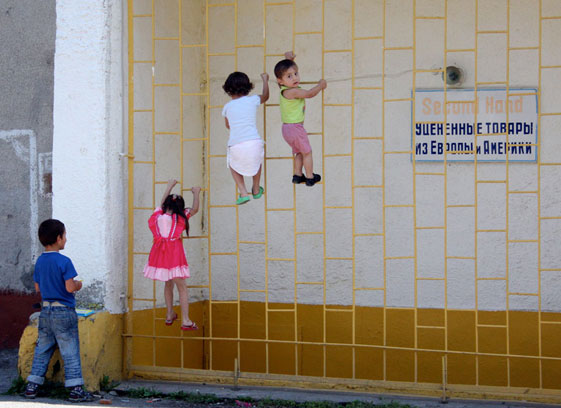 Many of the refugees in North Ossetia are children who need qualified psychological assistance. Photo: Thomas Hill/The IRC |
| In the aftermath of fighting between Russia and Georgia in Georgia’s embattled breakaway region of South Ossetia, thousands of people have fled to neighboring Russia’s North Ossetia region, where they require immediate assistance.
“Many of the refugees are children who have witnessed bombing and fighting and therefore need qualified psychological assistance,” says the International Rescue Committee’s Caucasus director, Thomas Hill. The IRC has joined forces with a Russian aid group to help. Story just posted on the IRC Web site here. How You Can Help: Donate now to help the IRC assist victims of the crisis in the Georgia region and other displaced people around the world. |
Posted in Caucasus, children, emergencies, howtohelp, war | Tagged: Georgia, humanitarian aid, North Ossetia, Russia, South Ossetia | Leave a Comment »
Recycling Hope through Data
Posted by Wynne Boelt on 18 July, 2008
 Mohamed lecturing. Photo: The IRC |
| Interview with Mohamed A. Saah, IRC Data Analyst/Officer for CYCLE in Liberia
Mohamed A. Saah fled Liberia as a refugee with his family when civil war broke out in Liberia in 1990. While living as a refugee in Guinea, Mohamed received an education with the help of the IRC. Today Mohamed works for the IRC helping other Liberians through the IRC’s Counter Youth and Child Labor Education (CYCLE) program. Below Mohamed discusses his life as a refugee in Guinea, his return to Liberia and his work with the IRC. When did you leave Liberia as a refugee? It was in late 1990 when my family and I fled to neighboring Sierra Leone and then to Guinea following the eruption of the civil crisis in my country Liberia. What was life like in Guinea for you? It would be simple to describe life in Guinea as a refugee as difficult and frustrating. But I believe I achieved a lot by getting an education, which is something no one can ever take from me. I am grateful to the government and people of Guinea, and to the IRC, the United Nations High Commissioner for Refugees (UNHCR) and other humanitarians for their relentless support. When did you first come into contact with IRC and how has the IRC helped you with your education? While in a refugee camp in Guinea, the IRC was the leading international organization for refugees’ education. The IRC’s education program really made a remarkable impact on my life. I got support for education as a refugee. In 1994, I began attending IRC-sponsored schools starting with primary school until graduation from high school. The IRC enrolled and retained me in school, trained my teachers, provided me educational materials and learning space through high school and further. It was a great help for me. Later I continued to a professional college by securing a grant funded by UNHCR through the IRC. I completed a three year course and received a diploma in Information Management. Can you describe your experiences with IRC in Guinea? I had a great experience with the IRC, from its education programs for refugees to its separated child tracing, reunification and reintegration programs from which I and many other refugees benefited. For a decade, the IRC has been committed to supporting the education of thousands of Liberian and Sierra Leonean refugee children by creating a learning space, enrolling children in schools, training and remuneration of teachers, providing scholastic material for students, among other ways. The IRC has also given us the opportunity to fight illiteracy in our society and restoring part of our lost hope. Today I work with the IRC in providing services to the needy. When did you return to Liberia and what did that feel like, what did you encounter when you returned and how long had you been away? I finally returned to Liberia in 2004 after the peace agreement that brought an end to the civil conflict. I really felt happy and boastful coming home because there is no place like home even though the war left the country in ruins and increased poverty among the people. For 13 years, my family and I stayed away in neighboring countries. How long have you been working for IRC and what is your current position? I have worked with the IRC for over a year and a half as a Data Analyst/Officer for the CYCLE program in Liberia. Why did you decide to work for IRC? I decided to work with IRC because I wanted to render to others some of the services that have been rendered to me while I was a vulnerable boy. My IRC job has also provided me the opportunity to earn an income that can help me and my family. Can you briefly describe some of your key responsibilities in this position? Some of my major responsibilities include managing the project’s database; going on field trips to review data collection and management procedures, making periodic reviews of data collection and management process, and helping to conduct surveys. What are some of the achievements that make you proud so far with your work with CYCLE? For the CYCLE program, I am proud of creating a temporary database and a physical filing system to manage beneficiary data during the first eight months of the program’s implementation. I am also proud of my ability to manage the program data alone during the early stage, which involved visiting field sites hundreds of miles apart to ensure data collection and the update of electronic databases. What are your future career goals and dreams? Since studying science in high school, my dream has always been to be an engineer, especially when it comes to reconstructing our war-ravaged nation. I am planning to enroll next semester in a continuing education program in the engineering department at the University of Liberia What do you think about Liberia and its future? I am still proud of Liberia. We have many challenges to overcome but the future of Liberia is bright. Progress will gear up and with peace, it is sure that Liberia will rise again amongst African nations. Outside of work what do you like to do in your spare time? I always spend my spare time reading and playing games like football and volley ball. Sometimes I spend my time talking with construction engineers in my area. I also enjoy listening to music. |
Posted in Africa, children, education, war | Tagged: education, interview, Liberia, Sierra Leone | Leave a Comment »













